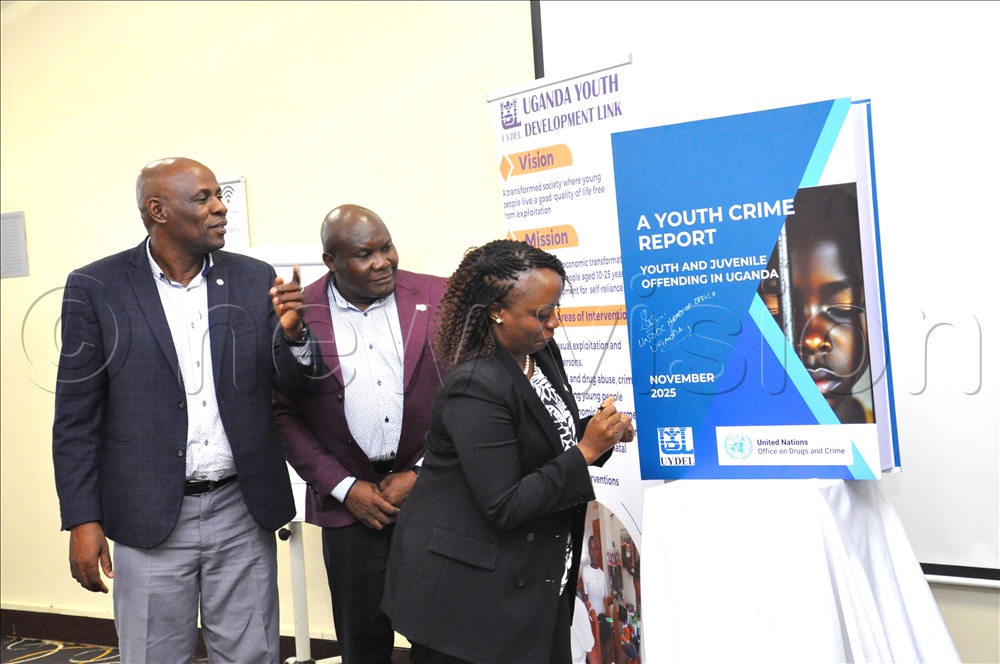'Uganda first African country to release juvenile crime report'
“Let us celebrate the small wins,” Kabirigi urged the audience. “We already have a 70% drop in juvenile cases.
(R-L) Milton Tiyo Director Correctional Services, Sharon Nyambe Head of Office United Nation Office of Drugs and Crime (UNODC), Odde de Jong First Secretary Rule of law Netherlands Embassy, Rogers Kasirye Executive Director UYDEL and other officials pose for a group during the launch of the Youth Crime Report at Protec Hotel Kampala on November 26, 2025. (Photos by Nancy Nanyonga)
________________
Uganda has made history as the first African nation to release a comprehensive, standalone report on juvenile crime trends, a landmark document funded by the United Nations Office on Drugs and Crime (UNODC).
The inaugural Youth Crime Report (2017-2024), an 84-page analysis, was launched at Kampala’s Protea Hotel in Kololo on November 26, 2025.
The event, attended by over 80 dignitaries from government, security organs and development partners, unveiled a dramatic 70% reduction in juvenile crime rates over the eight years.
John Kabirigi of the Justice Law and Order Sector (JLOS) hailed the achievement.
“Let us celebrate the small wins,” Kabirigi urged the audience. “We already have a 70% drop in juvenile cases.
This is not just a reflection of the last seven years; it is a roadmap for the next ten years.” He emphasised that the report provides a replicable model for future youth-focused justice interventions across the continent.
The report, produced in partnership with the Uganda Youth Development Link (UYDEL), offers an in-depth look at patterns in offences ranging from theft and assault to narcotics, robbery, and sexual crimes. While the overall decline is celebrated, the data reveal persistent challenges.
Dr Rogers Kasirye, the UYDEL’s executive director, who unveiled the report, noted that narcotic and sex-related cases remain stubbornly high, with over 5,000 such cases still registered annually.
(L-R) Rogers Kasirye Executive Director UYDEL and Rogers Mutaawe Senior Programme Manager UYDEL look on as Sharon Nyambe Head of Office United Nation Office of Drugs and Crime (UNODC) appends a signature on the dummy report. This was during the launch of the Youth Crime Report at Protec Hotel Kampala on November 26, 2025.
He also highlighted the profound impact of the COVID-19 pandemic, which caused notable spikes in crime due to school closures, unemployment, and psychosocial stress.
The report also sheds light on the critical issue of recidivism, with 3,266 repeat offenders registered nationwide by the end of 2024.
Milton Tiyo, the assistant commissioner general of Prisons, provided a sobering perspective, revealing that some inmates re-offend to return to the perceived security of prison, where one inmate wrote that "a prisoner is king' because 'he is fed and guarded'."
Sharon Nyambe, the UNODC’s outgoing head of office and the event’s chief guest, commended the collaborative effort.
She praised the Government of the Netherlands for its crucial support and UYDEL as a “natural partner,” while stressing the strategic importance of the work.
“We all know that Uganda is a young nation. The choices available to the youth will determine the trajectory for decades to come,” Nyambe stated.
Looking ahead, the report calls for a reinforced commitment to tackling the root causes of youth crime, including unemployment, poverty, and substance abuse.
It advocates for strengthened rehabilitative interventions and deeper multi-sectoral collaboration.
Echoing this community-centric approach, JLOS’s Kabirigi issued a simple but powerful recommendation: adopting personal mentorship programmes.
“We should always look out for a youth in our community and take him or her by the hand,” he said.